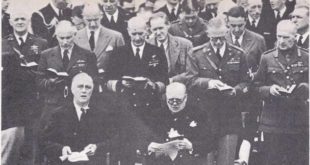Stalin had left behind him a world of suspicion, distrust and fear. Suspicion, distrust and fear were as great in his own country as anywhere else, for he had ruled as a dictator and had never set up a definite procedure for transferring power to another leader. Immediately after his death, a five-man presidium, or council, took over the rule of the Soviet Union. The presidium chose Georgi Malenkov, who had been Stalin’s right-hand man, as the new premier, but a number of factions were struggling for control of the government and one of them was led by Lavrenti Beria, …
Read More »Tag Archives: President Roosevelt
The United Nations and the Nations Disunited 1943 -1949
So at last, in the Pacific as in Europe, the guns were silent; the nations that had brought so much death and destruction to the world had been defeated, but victory alone was not enough. Governments had to be set up for the defeated nations, the destruction of war had to be repaired, hungry people had to be fed, industry and commerce had to be set in motion. Even more important, a way had to be found to keep war out of the world, to settle disputes between nations by peaceful means rather than by violence. The League of Nations, …
Read More »Victory in the Pacific 1941 – 1945
On June 25, 1940, the Japanese war minister said, “The present international situation is developing in a manner advantageous to Japan’s national policy. We should not miss the present opportunity. . . Japan’s national policy was scarcely a secret. It had already linked itself by treaty to the aggressor nations of Germany and Italy – for several years it had been fighting an undeclared war against China. Although Chinese guerrilla forces were fighting back the Japanese controlled most of the Chinese railroads and held such cities as Peiping, Shanghai and Canton. They planned to establish something they called the “Greater …
Read More »A World at War 1939 – 1941
Now the people of Europe began to hear a new sound, a sound that would haunt them throughout the years of war — the wail and shriek of air-raid sirens. At night, the lights of Europe went out and the “blackout” made familiar streets strange places of darkness. Street lamps were left unlit and windows were covered with heavy draperies. Any stray gleam of light might help guide enemy bombers to their targets. Hurrying about their wartime duties, the people of Britain and France began to wonder. They had not wanted war and yet war had come. Why? What had …
Read More »Victory in Europe 1941 – 1945
Even before Pearl Harbour, there had been cooperation between the United States and Britain. In August of 1941, President Roosevelt and Prime Minister Churchill met secretly, on a cruiser at sea off the coast of Newfoundland. There they drew up the Atlantic Charter, a document stating the principles on which they based their hopes for a better future for the world. They pledged that neither country would seek more territory. They hoped that, “after the final destruction of Nazi tyranny,” all men in all lands could “live out their lives in freedom from want and fear,” and they called on …
Read More »



